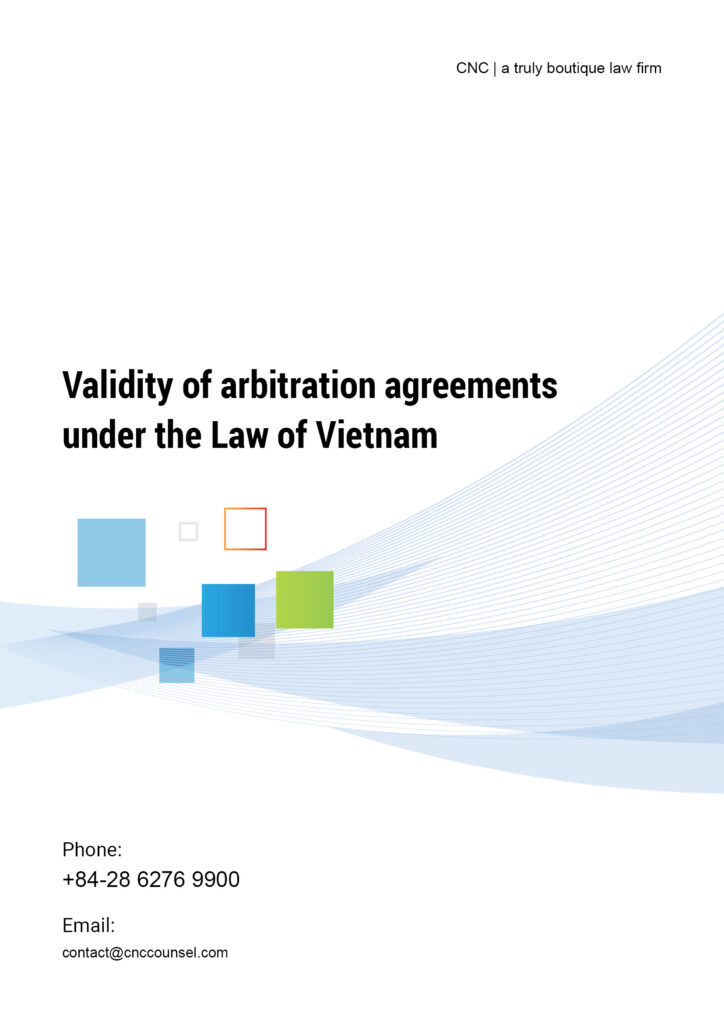Validity of arbitration agreements under the Law of Vietnam
A valid arbitral agreement is an important legal basis that allows for arbitration to be carried out in practices. The validity of arbitration agreements not only decide the jurisdiction of the Arbitral Tribunal, but also directly impact the legal validity of the arbitral award. Therefore, regulations pertaining to the validity of arbitration agreement has always been a matter of great concern to the parties whenever the establishment of arbitration agreement is involved.
In this article, CNC shall delve into issues impacting the validity of arbitration agreements under the law of Vietnam and issues revolving around ensuring the validity of arbitration agreements. At the same time, CNC shall also provide strategic proposals and recommendations that could provide effective support for enterprises during dispute resolution on the validity of arbitration agreements.
I. Principles for the determination of the validity of arbitration agreements under the Law of Vietnam
First and foremost, Law on Commercial Arbitration 2010 does not have detailed provisions of conditions for an arbitration agreement to be valid. Instead, these conditions are scattered throughout the articles of the document, such as Article 16 on the forms of arbitration agreement, Article 18 on invalid arbitration agreement, etc. The “negative listing”[1] approach adopted by the Law on Commercial Arbitration 2010 maximized the scope of cases in which the arbitration agreement is considered valid.
Valid arbitration agreement must be made “in writings”
In principle, arbitration agreements must satisfy the conditions regard to the form pursuant to Article 16, Law on Commercial Arbitration 2010, namely, they must be made in writings. The purpose of this condition is to verify the existence of an arbitration agreement in the most transparent manner possible, thereby preventing claims of the absence of arbitration agreements made by either parties, which might complicate or disrupt the arbitral proceeding.
Do note that, the condition of “in writings” is also provided for by the Law on Commercial Arbitration 2010 in a fairly flexible manner in comparison to the traditional interpretation of “in writings”. To be specific, Article 16 of the Law on Commercial Arbitration recognizes the following as satisfying the condition of “in writings” with regard to the form:
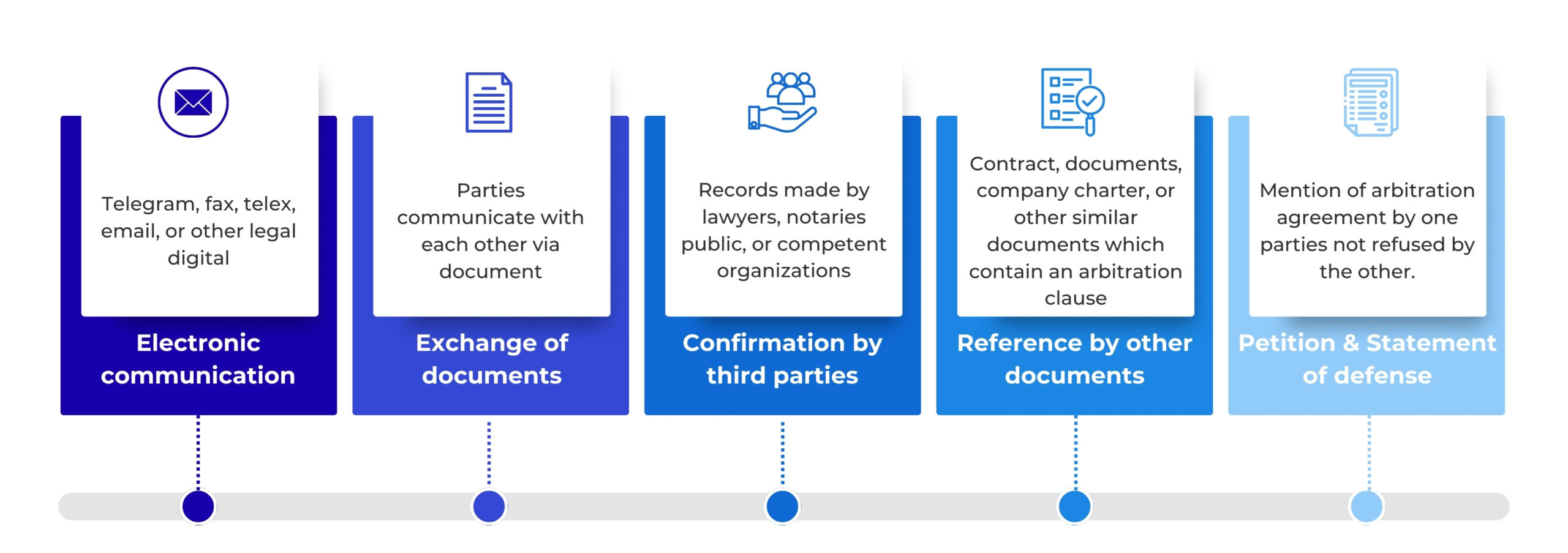
It should be further noted that, the existence of an arbitration agreement alone does not guarantee the validity and enforceability of that arbitration agreement. As mentioned above, a valid arbitration agreement should also take into account 02 (two) more elements:
- not classified as invalid under Article 18, Law on Commercial Arbitration 2010; and
- not classified as impracticable under Article 4, Resolution No. 01/2014[2]
Invalid arbitration agreement pursuant to Article 18, Law on Commercial Arbitration
Through the approach of legislators, it could be seen that, in principle, an arbitration agreement is considered valid if they are not classified as invalid. Therefore, even if there exists an arbitration agreement between the disputing parties, whether the dispute could be brought to arbitration depend on other fundamental factors, including the jurisdiction of arbitration, the capabilities of involved parties, and the willingness of the parties in the establishment of the agreement.
This principle demonstrates respect for the parties’ autonomy as well as ensures the balance between the freedom of contract and compliance with the Law of Vietnam. Accordingly, Article 18, Law on Commercial Arbitration 2010 provides a detailed list of cases in which the arbitration agreement is considered invalid as follows:

Arbitration agreements falling outside of the arbitration jurisdiction shall be invalid[3]
An arbitration agreement shall be invalid if the dispute subject does not fall under the arbitration jurisdiction. It should be noted that, dispute resolution via arbitration in Vietnam is only applicable to commercial disputes. Accordingly, the following three cases shall be under the arbitration jurisdiction:
Disputes arising out of commercial activities
Disputes arising out of commercial activities are under arbitration jurisdiction. Pursuant to Article 3.1, Law on Commerce 2005, commercial activities are activities with profit-earning purposes. Hence, arbitration agreement shall be considered valid if the dispute involved arising out of transactions, activities of commercial natures such as sale and purchases of goods, provision of services, investments, etc. Aside from the above disputes, in principle, disputes that are not related to activities with profit-earning purposes, such as civil, family and marriage, administrative disputes, etc, are not under arbitration jurisdiction.
One of the parties conducting commercial activities
Arbitration jurisdiction is not limited to disputes directly arising out of commercial activities but also covering disputes related to commercial activities, particularly, disputes in which one of parties is an individual or organization conducting commercial activities. This demonstrates that law on arbitration does not only focus on the nature of the transaction, but also the involved parties.
However, there exists some exceptions to the above, namely, disputes in which one of the parties conducting commercial arbitration and the other party is a/an:
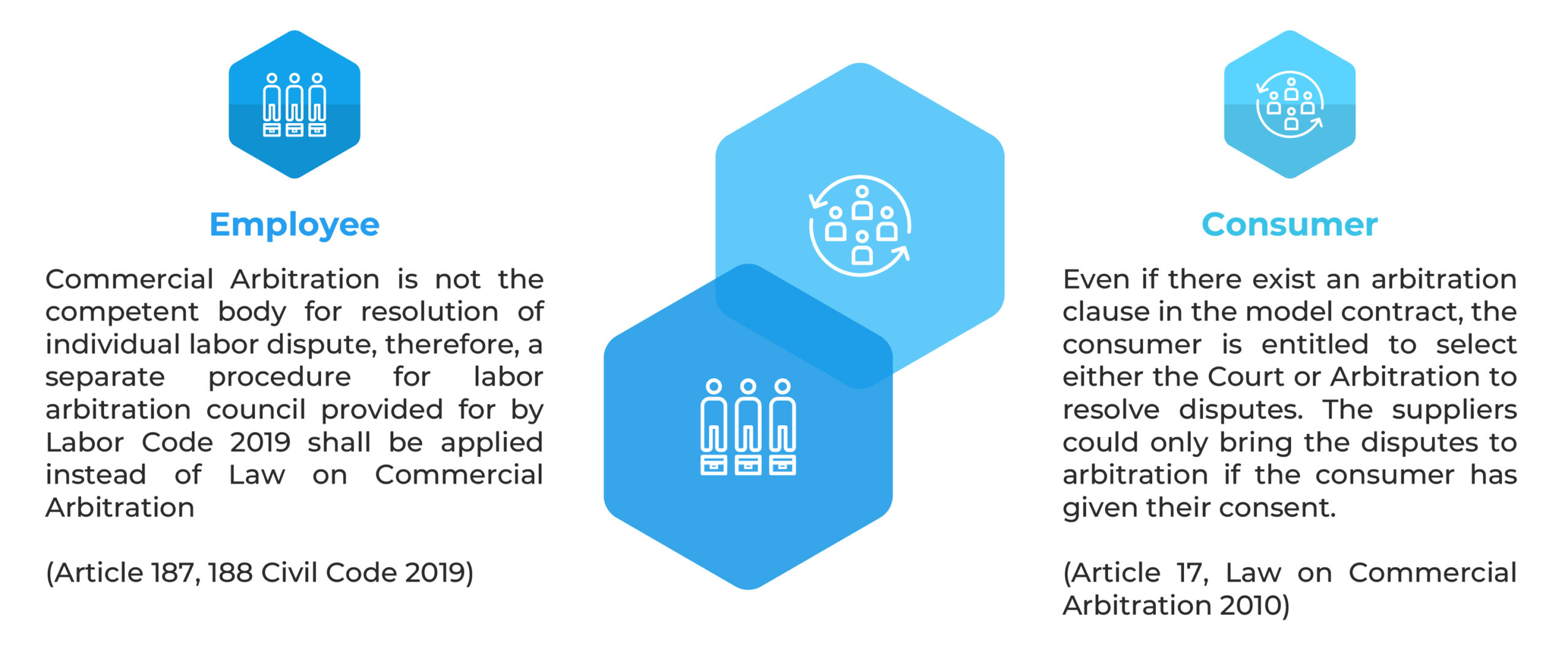
Disputes to be resolved by arbitration in accordance with the laws
Aside from the two cases above, the arbitration jurisdiction also covers other disputes specified in specialized laws. Some examples include: Article 14.2 of the Law of Investment 2020, Article 5.2 and Article 287.6 of the Marine Code 2015, Article 151.1 of the Law on Enterprises, Article 146.8.b of the Law on Construction, etc.
From the three cases above, it could be concluded that Vietnamese Arbitration laws adopt the “positive list” approach[4]. On the other hand, some other countries adopt the “negative list” approach, which means disputes that could not be resolved via arbitration shall be specified, and aside from the foregoing, for all other disputes, the parties are allowed to select arbitration as the method of dispute resolution. For example, the Arbitration Law of the People’s Republic of China place restrictions on only two groups of disputes:
“Disputes coming under the following categories shall not be submitted to arbitration:
(1) Disputes arising from marriage, adoption, guardianship, support and inheritance;
(2) administrative disputes that, according to law, should be handled by administrative authorities.[5]”
The “negative list” approach adopted by China also have certain merits, particularly, it allows parties more ease in the identification of the jurisdiction scope of arbitration, thereby limiting legal risks and increasing the predictability of arbitration legal system.
Invalid Arbitration Agreements due to Failure to meet the requirements of legal capacity of the party
Besides the arbitration agreement, the parties the agreement must also meet certain requirements in order for the arbitration agreement to take effect. Accordingly, arbitration agreement shall be deemed invalid if the parties to the arbitration agreement fall within one of the following three cases:
First, establishment of arbitration agreement by unauthorized signatories
Pursuant to Article 18.2, Law on Commercial Arbitration 2010, arbitration agreement shall be deemed invalid and nullified if the signatories are not authorized in accordance with the laws. To expand upon this, Article 3.2, Resolution No. 01/2014 provides the determination of unauthorized signatories as follows:
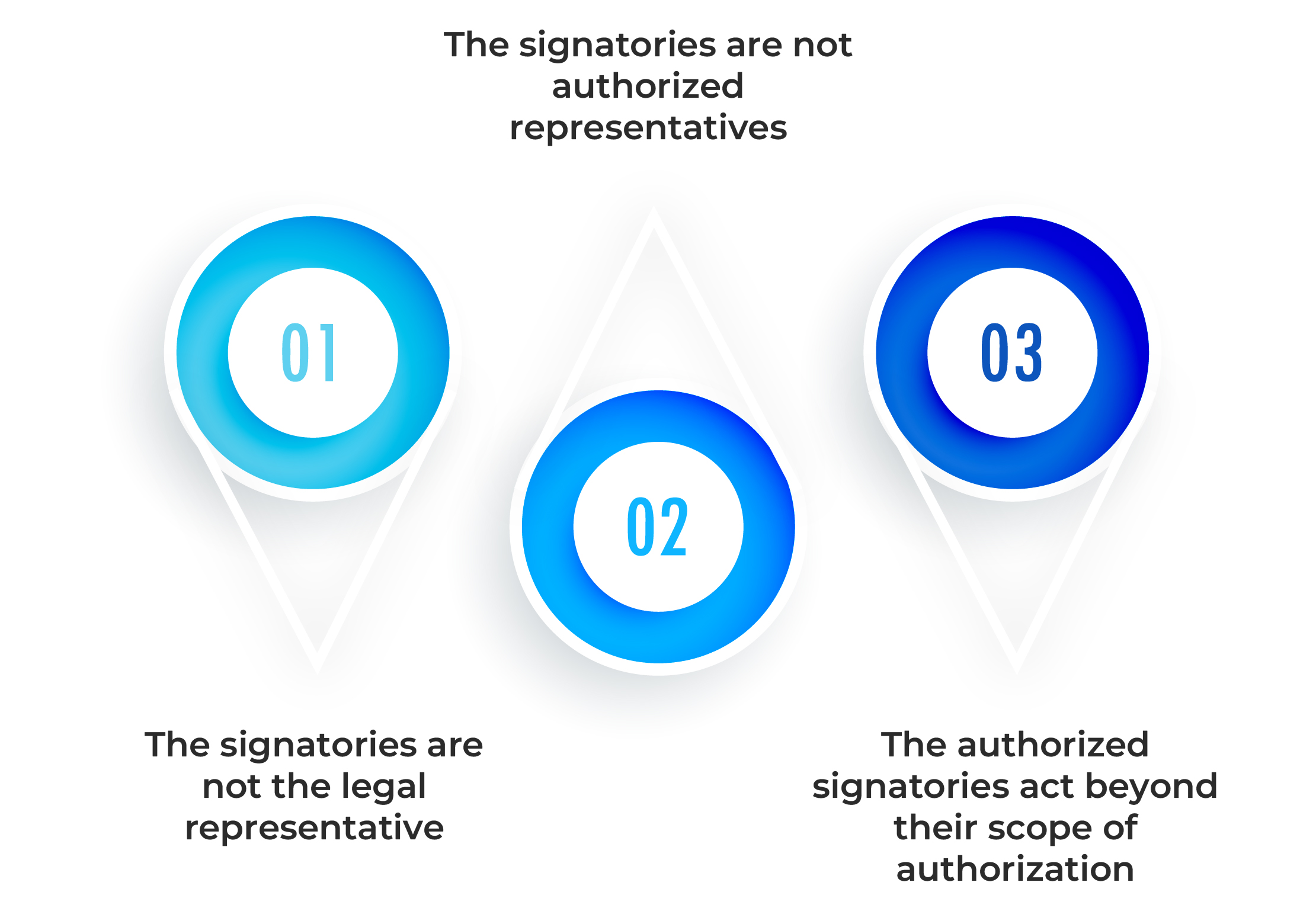
However, it should be noted that, even if in one of the three cases specified by Resolution No. 01/2014 as mentioned above, the arbitration agreement could remain valid if, throughout the establishment and performance or during the arbitration, the competent person has given their consent or raised no objection despite being aware of the act[6]. This approach reflects the principles of good faith and integrity in contractual relationship. Accordingly, once a party has recognized the validity of the arbitration agreement through their silence or participation, that party could not reject the validity of such agreement in order to gain advantage in the proceeding.
In practice, the Court of Ho Chi Minh City made a finding in Decision No. 810/2017[7] that, although the contract and the arbitration agreement is signed by Mr. Toshio, who is not the legal representative of the Respondent, the arbitration agreement remain valid because the Respondent has given its consent and raised no objection[8]. This finding of the Court of Ho Chi Minh City is both consistent with Article 3.2 of Resolution 01/2014 and the specific circumstances of the case, since the Respondent is completely aware of the existence of the arbitration agreement established by Mr. Toshio in the contractual relationship with the Claimant.
Accordingly, the evidence demonstrates that, throughout the construction progress, although the signatory is Mr. Toshio, the two companies has exchanged several documents and perform debt reconciliation, which constitutes the acknowledgement of parties’ rights and obligations. The above evidence also indicates that the Respondent go against the principle of good faith and integrity in the performance of contract by requesting for the invalidation of arbitration agreement, and thus the setting aside of previously issued arbitral award.
Second, the signatories do not have civil act capacity
Pursuant to Article 18.3, Law on Commercial Arbitration 2010, an arbitration agreement shall be invalid if “the signatories of the arbitration agreement do not have civil act capacity in accordance with the Civil Code”. Article 3.3 of Resolution 01/2014 also further clarified that “a person without civil capacity” is a minor, a person who his civil act capacity or having restricted civil act capacity.
Observedly, minors, people who lost their civil act capacity or having restricted civil act capacity could be categorized as a special group. They are individuals who does not have sufficient capacity to be aware of and control their action, or capable making voluntary and responsible decisions. Therefore, the laws have to provide safeguard mechanism for these individuals, ensuring that all transactions, including the establishment of the arbitration agreement, must be made via an appropriate representative in accordance with the laws to ensure that the rights and interests of these individuals are not violated. Arbitration agreement being considered invalid in this particular case helps prevent risks and ensure fairness in civil relation.
This mechanism is also consistent with Article V.1.a of the 1958 New York Convention. Accordingly, the Convention specifies that arbitral awards could have their recognition refused if the parties who established the related arbitration agreement are under some incapacity.
Third, one of the parties is deceived, threatened, or coerced
An arbitration agreement shall be invalid if it is established under deception, threat, or coercion. The purposes of this provision is to protect the principles of voluntariness and free will, which is originally the core foundation of all civil and commercial transactions. An agreement only has legal effect when the wills of the parties are reflected freely and independently.
As such, when a party is forced to enter an arbitration agreement, that party might request the Court to declare such agreement invalid[9]
Evidently, these acts turn arbitration agreement from a voluntary agreement into an imposed one. Therefore, it is necessary for the law to mandate that such an arbitration agreement is invalid in order to protect the lawful rights and interests of the parties, thereby ensuring fairness and transparency in civil relation.
Invalid Arbitration Agreement due to failure to comply with the requirement of form
As analyzed in Section 1, one of the necessary conditions for the validity of arbitration agreement is that the agreement must be made “in writings” as specified in Article 16, Law on Commercial Arbitration 2010. Hence, when an arbitration agreement does not meet requirement with regard to its form, such agreement shall be invalid pursuant to Article 18.2 of this law.
However, as mentioned in the previous section, the term “in writings” is to be interpreted in a broad sense. Instead of being limited to traditional document, the current law also encompasses exchange via electronic means such as email, fax, or archivable messages. Additionally, exchange between parties via petition and statement of defense in which one of parties fail to challenge the existence of the arbitration agreement could also be constituted as “in writings”.
Invalid Arbitration Agreement due to violation of legal prohibition
Article 18.6, Law on Commercial Law 2010 stipulates that arbitration agreements shall be invalid if they “violate legal prohibition”. This is considered a catch-all clause since the applicable scope is rather broad, which is different from other cases of invalid arbitration agreement (which follow the “negative list: approach”) analyzed above.
The establishment of “catch-all clause” demonstrates the legislator’s proactive approach in creating a backup mechanism, in the context of being unable to fully anticipate all situations that may arise in practice. As a result, the provision functions as a ‘safeguard’ mechanism, allowing the invalidation of an arbitration agreement in any case where the content or purpose of the agreement violates legal prohibitions.
Accordingly, “legal prohibition” should be interpreted in a strict manner, which means the law must explicitly state “prohibit” instead of other term such as “restricted”, “conditional”, etc
Impracticable Arbitration Agreement
In addition to cases of invalid arbitration agreement as analyzed in Section 2, another exceptional circumstance that directly affects the enforceability of an arbitration agreement is impracticable arbitration agreement.
Impracticable arbitration agreement refers to an arbitration agreement that has been duly established and is legally effective but could not, in practice, be carried out, thereby depriving the arbitral tribunal of jurisdiction to resolve the related dispute[10]. This makes it an exceptional case that must be carefully considered when entering into an arbitration agreement. For clarity, Article 4 of Resolution No. 01/2014 explicitly stipulates the circumstances under which an arbitration agreement is deemed impracticable, including:
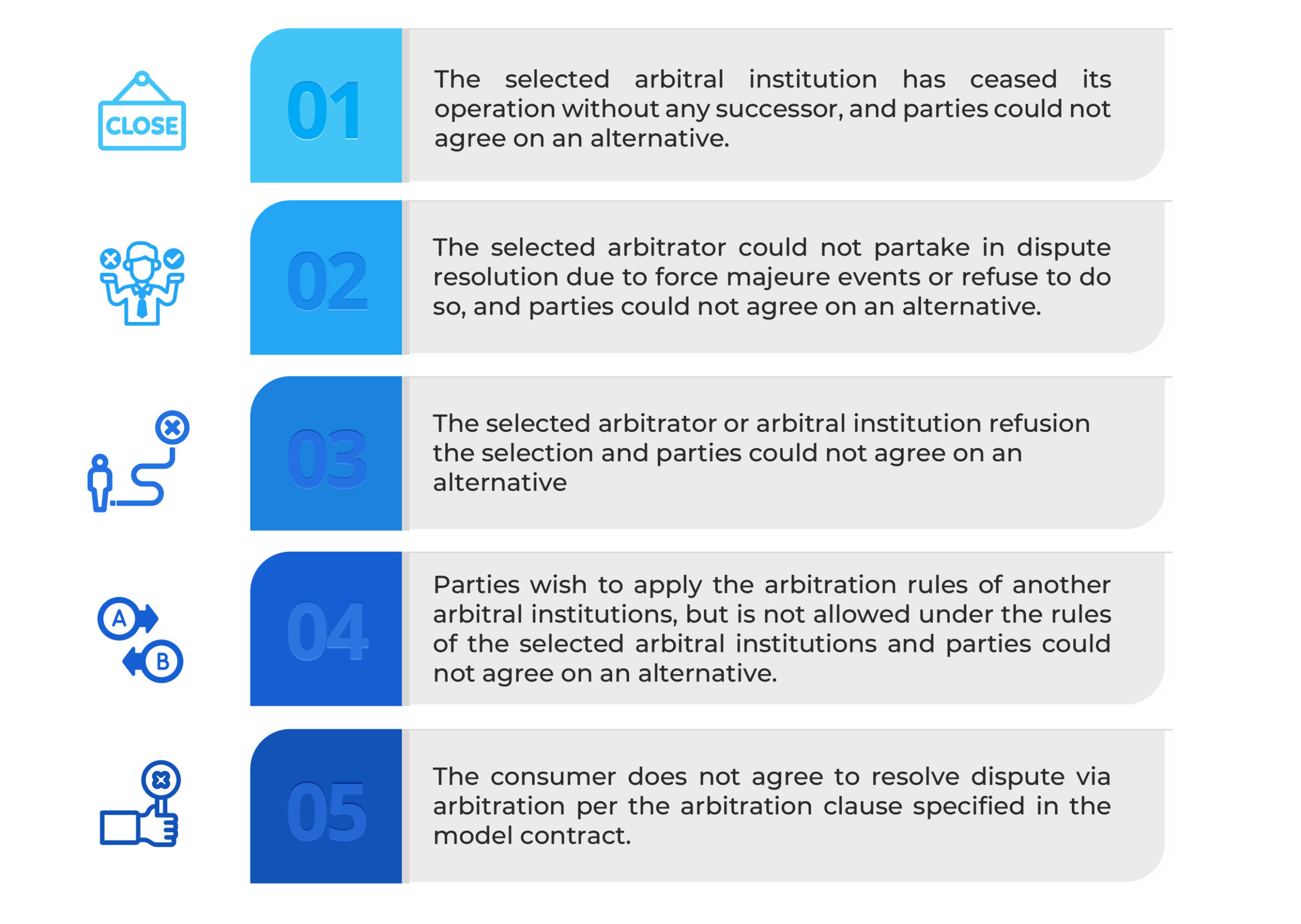
However, in practice, the determination of the impracticable arbitration agreement is a debated issue. This is because there exist other applicable cases aside from those provided for by the laws.
A typical example would be a case in which parties agree to select an arbitral institution whose name does not factually exist. In Cassation Decision No. 08/2021/KDTM-GDT dated 15/07/2021, the Council of Judges of the Supreme People’s Court made the following finding[11]:
“As there exist no arbitral institution with the name “Vietnam International Arbitration Center at Vietnam Chamber of Commerce and Industry of Ho Chi Minh City” as agreed by the parties, the arbitration agreement shall be deemed impracticable…”
Regarding the determination of impracticable arbitration agreement, there exist two schools of thought, to be specific:
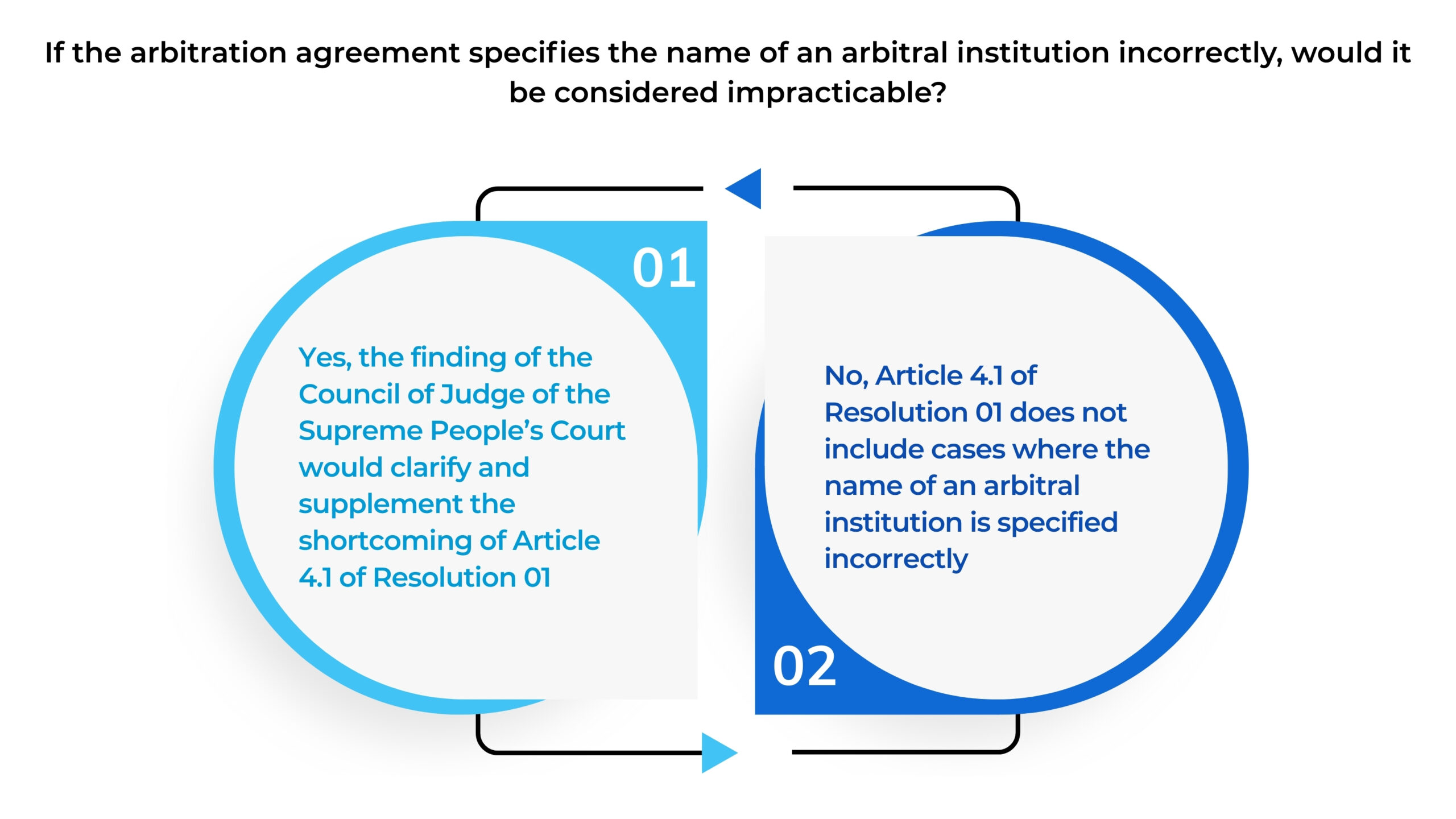
Each viewpoint is supported by different reasonable grounds. In our opinion, however, this case should not be classified as an impracticable arbitration agreement under Article 4.1 of Resolution No. 01/2014. This is because, in the case at hand, rather than the selected arbitral institution having ceased its operations without a successor, parties only specified an incorrect name of an arbitral institution. In this case, it would be more appropriate to consider such arbitration agreement fall under Article 43.5 of Law on Commercial Arbitration 2010, as it shares the nature of an “unclear arbitration agreement” and the parties should be required to clarify the matter prior to the initiation of legal action.[12]
II. Issues regarding the validity of arbitration agreement
Validity of Unclear Arbitration Agreement
An “Unclear arbitration agreement” may be regarded as a derivative form of an impracticable arbitration agreement under Article 43.5 of Law on Commercial Arbitration 2010. In other words, an unclear arbitration agreement, in essence, is a valid and enforceable agreement once clarification is provided by the parties. Thus, the dispute resolution of these cases is more likely to fall under the arbitration jurisdiction instead of the Court’s jurisdiction.
Article 43.5 of Law on Commercial Arbitration 2010 describes this situation as one in which the parties have entered into an arbitration agreement, but the agreement does not specify the type of arbitration or does not identify a specific arbitral institution. In such circumstances, the Law on Commercial Arbitration 2010 still allows the parties to ‘clarify’ the agreement by reaching a supplementary agreement on the missing or undefined content. If the parties cannot reach such an agreement, the type of arbitration or the arbitral institution shall be determined through the request of the claimant.[13]
Doctrine of separability
Currently, it is not uncommon for people to have concerns or misconceptions that the validity of an arbitration agreement depends on the validity of the main contract. However, Article 19 of the Law on Commercial Arbitration 2010 affirms the separability of an arbitration agreement from the principal contract, including its separability in terms of validity:
“An arbitration agreement is entirely separate from the contract. Any modification, extension, cancellation, invalidation or impracticability of the contract will not invalidate the arbitration agreement”[14]
This provision serves to safeguard rights to arbitration, preventing a party from deliberately invoking the invalidity of the contract to disrupt or even to avoid having the dispute resolved through arbitration. This principle is also recognized in the UNCITRAL Model Law[15] and in the practice of many legal systems, notably the Arbitration Law of the People’s Republic of China[16].
However, it should be noted that when a contractual relationship is transferred, the arbitration agreement is also transferred accordingly. Pursuant to Article 7.3 of Resolution No. 01, when rights and obligations arising from a transaction or contract containing a valid arbitration agreement are transferred, that arbitration agreement remains effective against both the transferor and the transferee. This ensures the continuity and enforceability of the arbitration agreement, even when the parties to the contractual relationship are changed.
The discovery that an arbitration agreement is invalid or incapable of being performed may arise at different stages of the dispute resolution process. At each stage, the legal consequences will differ [17], thereby requiring businesses to adopt appropriate response strategies to safeguard their interests
What action should enterprises take in case of invalid or impracticable arbitration agreement
The discovery that an arbitration agreement is invalid or impracticable may take place at different stages of the dispute resolution process. Depending on the stage in which the discovery is made, the legal consequences shall differ[17], thereby requiring businesses to adopt appropriate response strategies to safeguard their interests.
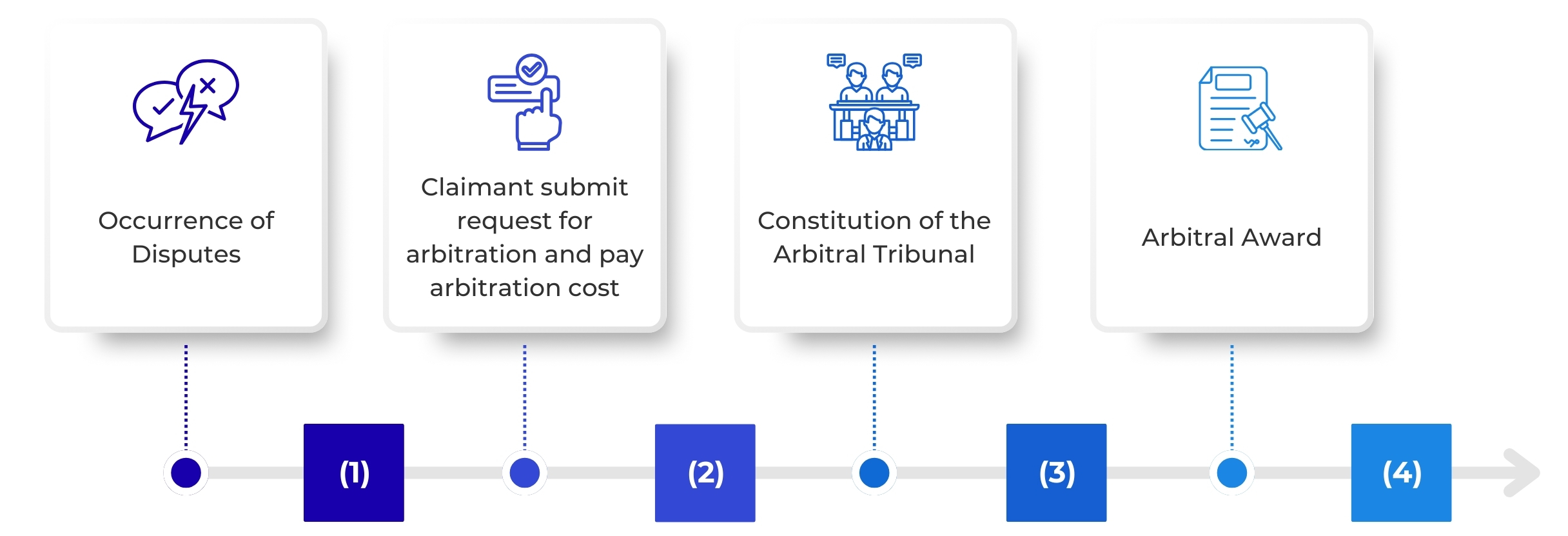
Pre-arbitration
If the discovery is made prior to the proceeding, the Claimant have two solutions:
(i) Proactively negotiate with the other party to “rectify” the arbitration clause through either an appendix or a separate agreement.
(ii) If it is found that the arbitration agreement is clearly invalid/impracticable, instead of requesting for arbitration and risking a prolonged the dispute resolution process, it is possible to pursuit the case via litigation in accordance with Article 6 of Law on Commercial Arbitration 2010.
Before the Constitution of the Arbitral Tribunal
In cases of institutional arbitration, the parties to a dispute should note that the validity and enforceability of an arbitration agreement may be reviewed by the arbitral institution with which the claimant files the request for arbitration. If the arbitral institution determines that the arbitration agreement invoked by the claimant is invalid, void, or impracticable, the arbitral institution shall refuse to accept the case.
In this case, the Claimant should prepare a “double” plan, which include:
+ Amendment to the arbitration clause (if the opposing party agrees); or
+ Prompt filing of lawsuit with the Courts to avoid waste of dispute resolution time.
Furthermore, in practice, there are many cases the issue of the validity of the arbitration agreement is not identified during the reviews of the request for arbitration by the arbitral institution. Instead, it is only raised by the Respondent after the arbitral institution has already accepted the case and commenced proceedings.
At this stage, from the perspective of the Respondent in the dispute, if the enterprise believes that the arbitration agreement is invalid or impracticable, the Respondent must immediately challenge the jurisdiction of the arbitral tribunal in its statement of defense, rather than waiting until an award is issued. Moreover, such objections must be maintained consistently in order to avoid ‘waiver of objection rights’ under Article 13 of Law on Commercial Arbitration 2010.
After the Constitution of the Arbitral Tribunal
Once the Arbitral Tribunal has been constituted, it is required to review its own jurisdiction, including: (i) the validity of the arbitration agreement; (ii) the enforceability of the arbitration agreement; and (iii) its own jurisdiction (the principle of competence-competence). If the Tribunal determines that the arbitration agreement is invalid or impracticable, the Tribunal shall issue a decision to terminate the proceedings[18]. In such circumstances, the Claimant should promptly prepare and refile its claim before the competent court in accordance with the Civil Procedure Code.
In cases where the Arbitral Tribunal decides that it still has jurisdiction to resolve the dispute despite the Respondent’s objection on the grounds that the arbitration agreement is invalid or impracticable, the Respondent may file a petition with the competent court requesting judicial review of the Tribunal’s decision pursuant to Article 44 of Law on Commercial Arbitration 2010. If the Court concludes that the arbitration agreement is invalid or impracticable, the arbitral tribunal must issue a decision to terminate the proceedings.
After the issuance of the Arbitral Award
If the arbitration agreement is found to be invalid subsequent to the issuance of the arbitral awards, enterprises might face a rather severe risk of the issued arbitral award being set aside. To be specific:
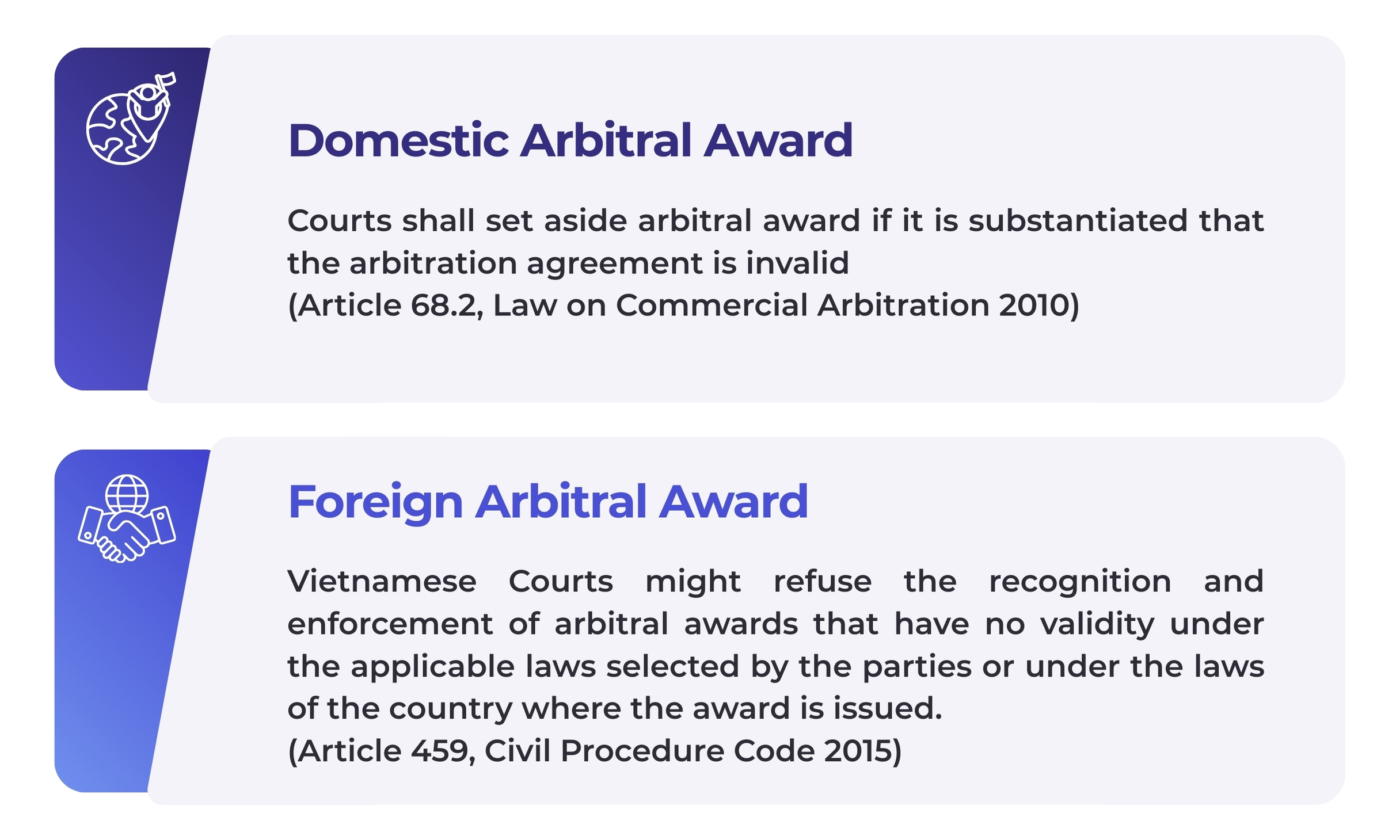
For domestic arbitral awards, enterprises might re-negotiate to bring the dispute to arbitration for resolution or initiate litigation pursuant to Article 71.8 of Law on Commercial Arbitration 2010.
For foreign awards, enterprises must promptly evaluate the scope of the award debtor’s property: If the property is located in another country, the prevailing party may consider initiating recognition and enforcement proceedings in that country under the 1958 New York Convention. However, if the assets are located solely in Vietnam, commencing litigation at Vietnamese Courts is an option, though careful consideration must be given to the statute of limitations, litigation costs, and the realistic likelihood of success. Therefore, for enterprises who are award creditors, strict monitoring of the validity and enforceability of the arbitration agreement since the negotiation and contract conclusion stages is of critical importance in order to minimize risks at the post-award stage.
III. Conclusion and recommendation
To ensure the validity and enforceability of an arbitration agreement, the parties should first consider adopting the model arbitration clause issued by the arbitral institution of their choice. This not only helps minimize risks concerning both form and substance, but also ensures consistency with procedural rules that have already been standardized and stably applied in practice.
Another issue that parties should pay attention to is that the arbitration agreement must clearly specify the selected arbitral institution. Identifying the arbitral institution in a precise manner eliminates the risk of disputes over jurisdiction or the arbitration clause being deemed impracticable due to ambiguity. In addition, the parties should also agree transparently on the type of arbitration (institutional or ad hoc), the applicable procedural rules, as well as other essential elements such as the language, seat, and number of arbitrators.
In cases where flaws in the arbitration agreement are identified, the parties should promptly and proactively negotiate to amend or supplement the agreement. Early adjustments not only ensure the practical enforceability of the agreement but also reduce the risk of the agreement being deemed invalid, which would result in the right to arbitration — a dispute resolution method that is generally faster and more flexible than litigation.
From the above analysis, prudence at the stage of drafting and reviewing arbitration clauses is a key factor. Such caution not only helps the parties strengthen the legal validity of the agreement but also enhances the practical effectiveness of commercial arbitration as a reliable dispute resolution mechanism
Contact
For more information, please contact:
CNC Vietnam Law Firm Co., Ltd
Address: The Sun Avenue, 28 Mai Chi Tho, Binh Trung Ward, Ho Chi Minh City, Vietnam
Phone: 028 6276 9900
Hotline: 0916 545 618
Email: contact@cnccounsel.com
Website: cnccounsel
Managed by
 |
Le The Hung | Managing Partner
Phone: 0916 545 618 Email: hung.le@cnccounsel.com |
 |
Kieu Nu My Hao | Associate
Phone: 036 619 2305 Email: hao.kieu@cnccounsel.com |
 |
Nguyen Le Anh Thu | Legal Assistant
Phone: (84) 28 6276-9900 Email: thu.nguyen@cnccounsel.com |
[1] “Negative list” approach means that only cases of invalid arbitration agreement are listed, aside from those, all other arbitration agreements are considered valid arbitration agreement.
[2] Resolution No. 01/2014/NQ-HDTP dated 20/03/2014 of the Council of Judge of the Supreme People’s Court on guidelines for provisions in Law on Commercial Arbitration 2010.
[3] Article 2, Law on Commercial Arbitration 2010
[4] “Positive list” approach means that arbitration as a means of dispute resolution is only available the listed sectors, aside from those, it should be interpreted that arbitration is not available as a means of dispute resolution.
[5] Arbitration Law of the People’s Republic of China, [https://english.court.gov.cn/2015-09/11/c_761548_2.htm], accessed on 08/09/2025
[6] Article 3.2, Resolution No. 01/2014
[7] Decision No. 810/2017/QD-PQTT dated 29/06/2017
[8] MCAC, “Chuyên đề: Thỏa thuận trọng tài được xác lập bởi người không có quyền đại diện theo pháp luật”, https://mcac.vn/hop-dong-do-nguoi-khong-co-quyen-dai-dien-theo-phap-luat, accessed on 15/08/2025.
[9] Article 127 of the Civil Code provides that, deception is an act that intentionally cause other parties to misunderstand the nature of the transaction, causing them to conclude contracts without being fully aware of their rights and obligations. Meanwhile, threat and coercion is the use of violence or mental intimidation that force one party to enter a transaction in order to avoid harm to their or their acquaintance’s life, health, dignity, or property.
[10] Article 6, Law on Commercial Arbitration provides that, in the vent the arbitration agreement established between the parties is classified as impracticable under Article 4 of Resolution No. 01/2014/NQ-HDTP, the Court shall be the competent jurisdiction for the dispute resolution instead of arbitration.
[11] Phuong Linh, “Về trường hợp thỏa thuận trọng tài không thể thực hiện được”, https://www.toaan.gov.vn/webcenter/ShowProperty?nodeId=/UCMServer/TAND308180, accessed on 15/08/2025
[12] Further clarified in Section II.1
[13] Article 43.5, Law on Commercial Arbitration 2010
[14] Article 19, Law on Commercial Arbitration 2010
[15] Article 16.1 of the UNCITRAL Model Law also provides that an arbitration clause contained in a contract shall be considered an agreement separate from other clauses of the contract. The invalidation of the contract does not automatically translate into the invalidation of the arbitration agreement.
[16] Article 19, Arbitration Law of the People’s Republic of China also provides that the validity of an arbitration agreement is entirely independent and irrespective of the amendment, cancellation, termination, or invalidation of the contract
[17] Dương Hồng Nhung (2025), “Hoàn thiện quy định về thỏa thuận trọng tài vô hiệu theo Luật Trọng tài Thương mại năm 2010”, Law and Democracy Journal, Volume 1 (424), page 12-13
[18] Article 43.1, Law on Commercial Arbitration 2010.
Disclaimer:
This article was prepared to be used for the purpose of introducing or informing clients about issues and/or developments of legal perspectives in Vietnam. The information presented in this article does not constitute advice of any kind and may be subject to change without prior notice.



